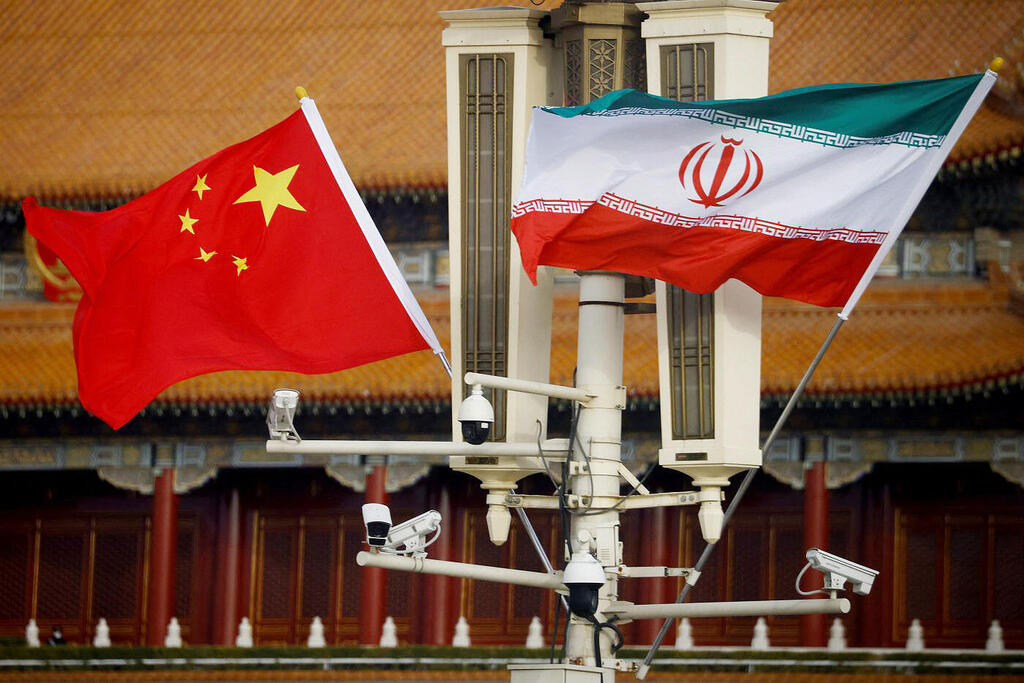
"Israel definitely needs to reconsider its strategy towards China"
"Israel definitely needs to reconsider its strategy towards China"
Sinologist Dr. Uri Sela discusses how China's support for Iran and Palestinians is part of its fight with the Americans rather than Israel, and why Israel would be wise not to seek a fight with China
Dr. Ori Sela is a senior lecturer at the Department of East Asian Studies at Tel Aviv University and a senior visiting researcher at the Israeli-China Policy at the university’s Institute for National Security Studies. His research focuses on, among other things, the history of science and technology in China, its military history and foreign relations.
This week, following Iran's attack, we saw evidence that Israel is part of a Western-Suni axis led by the U.S. Is it correct to say that on the other side of the seesaw, the opposing axis is Iran, Russia, and China?
"When talking about China, one must be very careful not to associate it with any axis or bloc, as these terms suggest that member states share a broad array of interests, values, or directions. China isn’t interested in being part of a bloc but aspires to achieve global supremacy. It also does not view Russia or Iran as equal partners. From its perspective, it leads in its relationship system with Russia and Iran, using both as tools to achieve its goals."
In what way does China use them?
"Firstly, on an economic level: since both Russia and Iran face extensive sanctions, to which China does not attach much importance, it takes advantage of the situation to purchase large quantities of cheap oil from both. Secondly, on a strategic level: Iran serves as a hub of resistance to the United States in the Middle East, and Russia serves a similar role in Europe. Cooperation with them serves the overarching goal of weakening American global hegemony and diverting Washington's attention from what is happening on China's home turf in East Asia."
Even if it's only done out of self-interest, is China’s support for Iran at the same level as America’s support for Israel?
"There is no comparison between China-Iran relations and Israel-US relations. China simply does not maintain such relationships. One needs to go back in time to understand how the relationship between China and Iran was formed and strengthened: in the early 1980s, Iran was embroiled in a war with Iraq, shortly after the Islamic Revolution, and China sought to strengthen its arms industry and make it more profitable as part of its massive economic reform. China saw that there was a significant and prolonged war in the Middle East between two countries in need of arms and ammunition, which most of the world refused to supply—so it began exporting weapons to both. There are also reports that China assisted Iran in its nuclear program.
"In the early 1990s, China grew at a phenomenal rate and became increasingly energy-dependent—thus Iran became a wonderful source of oil and an important energy partner for China. Later on, the energy aspect became even more significant."
Does this mean that the means of warfare launched by Iran this week came from China?
"You're asking if some of the elements we saw in the attacks, such as the drones, cruise missiles, or ballistic missiles, are linked to China? It's possible. But these connections are actually stronger between Russia and Iran."
It seems that China has aligned with Hamas against Israel since October 7th. Should Israel consider China an adversary?
"No, at least not fully. Israel has no special reason to seek another enemy - we have enough. Israel also greatly needs China in terms of supply chains, especially when there are still unresolved issues with Turkey. But Israel will definitely need to reconsider its strategy towards China and consider, for example, changing its trade methods."
How should Israel handle China?
"Israel needs to learn how to minimize risks from countries that already have complex relationships with China, such as Japan and South Korea. Since China is involved with countries that pose a direct threat to Israel, we must ensure that we do not indirectly contribute to Chinese developments that could later backfire on us."
How do we do that?
"For example, by defining the scientific and technological areas where there is such sensitivity. And then acting both through regulation and by increasing awareness in academia and industries regarding this issue."
China's Huawei was disqualified this week from participating in the tender for building a port in Haifa for “national security reasons." There have been similar cases in the past in other infrastructure projects in Israel. Is the concern justified? Are the Chinese really spying on us?
"These reports need to be taken with a degree of skepticism, understanding that many decisions aren’t necessarily related to a real, concrete security threat but to broader strategic considerations, such as Israel's desire not to anger the Americans too much.
"In most of the infrastructure projects, most of the concerns aren’t realistic. For example that China is spying with building cranes or that China will use its cyber capabilities to disable them. It's not that there's no risk, but there are other ways to deal with it other than disqualifying them. Israel needs to take responsibility to send the National Cyber Security Authority to verify the rumors."
Why stop at infrastructure projects? What about electric cars? Should we ban TikTok?
"There is a lot of truth in what you're saying. Electric cars and TikTok possess far more concerning elements than building a port in the Gulf. You have tens of thousands of Chinese cars in Israel, constantly filming their surroundings and transmitting all their information - or at least they can do so - and receiving updates continuously. And if that's not enough, then we see that government defense companies are giving contracts to the Chinese."
Why does China support the Palestinians?
"When you talk to the Chinese about this, they say, 'What do you want? This is how we've always behaved,' and there's truth to that. For years, China has clearly and unequivocally expressed support for the Palestinians."
What interest does China have in intervening in what's happening in this region?
"[China’s] goal is to gain a more significant footprint in the Middle East, especially diplomatically and economically. We saw this in the peace agreement between Iran and Saudi Arabia about a year ago, which China took credit for even though it played a small role. It was its attempt to say, 'I want to be a more meaningful part of the region, but I let countries manage themselves. I'm not like the United States that tells countries what to do, I don't interfere in their internal affairs.' This is despite the fact that it does."
This also in part explains the Americans' complete mobilization to our side.
"Right. The overwhelming American involvement in our region since October 7 is not just due to President Biden's strong Zionist sentiments. There are much bigger issues at stake. Our campaign in Gaza is part of the competition between America and China for dominance in the Middle East. This is why our normalization agreement with Saudi Arabia is so critical for Americans, and should also be critical for Israel. Because it will settle American dominance in the area, and the alternative to that is Chinese dominance, with all of its implications."
All of this is happening against the backdrop of an unprecedented economic crisis in China. What exactly is going on there?
"The credit rating company Fitch issued a negative credit forecast for China this week, after Moody's made a similar move a few months ago. There are several reasons for this: the first is the crisis in the Chinese real estate market - bankruptcies of companies, apartments that are not delivered to buyers, etc. We are talking here about trillions of dollars going down the drain; The second is a crisis in the financial system: the government approved huge loans for all kinds of projects, which are not based on a proper and correct business plan, and the result is a loss of hundreds of billions of dollars, maybe more. The third reason is the flight of foreign investors from China, who take tens of billions of dollars out of the country with them. And, to all this must be added rising unemployment rates among the young.
"This does not mean that the Chinese economy is now collapsing. Let’s maintain some sense of proportion. China's economy is still strong and it is still advancing, but it has very significant challenges which are beginning to directly affect performance."















